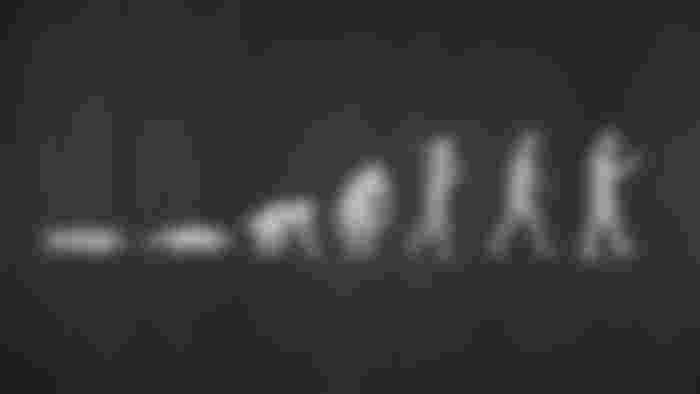
When did our ancestors first learn to speak? Did the thousands of languages that people now speak come from that one ancestor? Is it possible to find its source from the history of these languages? That's what writer and language lover Michael Rosen is looking for ...
"Humans are the only animals on earth that have a language, and we are different from other animals because of that language," said Maggie Tollerman, a professor at Newcastle University.
The exchange of ideas through language is seen as an important aspect of evolution. This language has changed everything. And that's why people are so curious about the origin of language.
"Language is one of the most complex issues and that's what made us human," said Robert Foley, a teacher and anthropologist in the Department of Human Evolution at Cambridge University.

How old is the language?
At present, people in the world speak about six and a half thousand languages. But which is the oldest language?
If we want to know the name of the oldest language, many of us think of Babylonian, Sanskrit or Egyptian.
But Professor Tollerman says these languages are not even close to him. Usually we say that the language is six thousand years old. But if we want to find the real source of language, we have to go back at least 50,000 years.
Many linguists think that the history of language is actually even older.
"Many of us believe that language may have originated five million years ago," said Professor Tollerman

The same ancestor
Although the characters in all the languages of the world are different, "it is also possible that all languages now have their ancestors," said Professor Foley.
From the history of the evolution of biology, scientists have been able to get closer to when language began. According to geneticists, we all come from a small population in Africa.
There may be other languages outside of this list of languages, but most of the languages we hear today are probably evolved from the same language.

Evidence from fossils
From the fossils of our ancestors we get some idea of exactly when we started talking.
Professor Foley says, "It's a kind of breathing. It's the way we make sound by controlling it."
To do this we have to have control over the muscles of the body. "The membrane between our chests and abdomen is different from others. The number of nerves in our membranes is many times greater than the membranes of animals that are close to us, i.e. monkeys or apes, who cannot speak."
These nerves mean “our spinal cord is thicker than the spinal cord of the ape and our vertebral column is also a little wider.
If we look at the extinct relatives of Neanderthals who lived on earth six hundred thousand years ago, we can see that their spinal column was also wide.
But if you look at Homo erectus a million years ago, the oldest ancestors of mankind, they did not have it in their bodies. This gives an idea of when people started talking.

The role of genetics
Scientists say that even beyond the record of fossils, it is becoming possible to know the age of language due to the advancement of genetics.
"There is a gene called FOXPitu. This gene is present in the body of almost all mammals. But what is in the human body is its mutated gene," said Professor Foley.
"Research into this mutation in the gene also shows why humans can talk, but chimpanzees can't. This gene plays an important role in the development of speech and language. Because people who don't have this gene mutated have difficulty speaking."
Interestingly, Neanderthals, like humans today, had this FOXPitu type of gene. This suggests that they also had some kind of speech or language.
But whether their language was complete and advanced is a different matter.
Professor Tollerman says there is a difference between words and language. However, it is difficult to determine the reason why speech once became a language from genetic evidence.


The size of the brain
Is it possible to trace the origin of language from the shape of the skull of primitive man? Of course not.
The simplest reason is that we don't know exactly how big a brain is needed to create a language. "Neanderthals' brains were bigger than ours because they were bigger as animals," said Professor Tollerman.
What was the first word
When we are talking about the language of the beginning of mankind, what can we say when the first word was uttered from the mouth of man?
"The honest answer is: we have no idea," said Professor Foley.
The words that are thought to have originated in early human history may have meant 'eagle', 'cheetah' or 'look.'
Many think that something simple and precise around our environment may have come first from the human mouth.

Another theory is that among the earliest words were the ones we always use now. Such as: Ish, Hey, Wow, Thanks, Goodbye - such words.
These words are present in almost all languages. But the similarity between them is that they have no syntax or grammar.
Language was created while eating?
Mankind began to talk in the beginning, cooperating with each other as well as taking food.
Our ancestors lived by eating meat from the carcasses of animals killed by large predators.
"You would need some more people with you to eat meat from the carcasses of animals killed by hyenas. Because it was a dangerous job," said Professor Tollerman.

When you go out looking for food, you also find a good carcass of an animal and you want to let the people in your group know that there is good food nearby, then you need a language, ”he said.
Scientists believe that the urge to eat and the tendency to survive have created a tendency for humans to communicate with each other.
The role of gossip
The ability to work together also builds the ability to use language, scientists say.
"Mutual cooperation has played an important role in this," said Professor Foley, "especially in allying and trying to find out what's going on around us."
"It's no less important to talk like this gossip. Gossip, gossip or gossip are part of everyday life," said Cambridge University language historian Dr. Laura Wright.








Nice and beautiful article... Thanks for sharing